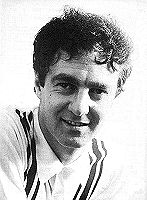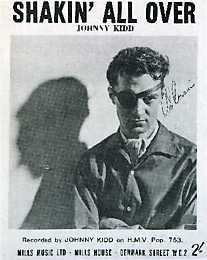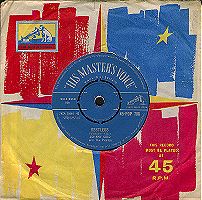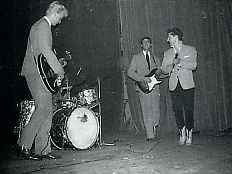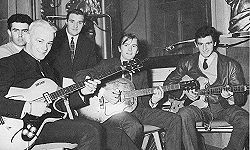2: 1960-61: Shakin' All Over
|
For his third 45, the singer had tackled Marv Johnson’s "You Got What It Takes" co-written by future Motown founder, Berry Gordy. Although Johnson made the top five, Kidd's ambitious interpretation, paired with "Longin’ Lips" still took him into the top 30, a reasonable start to the New Year. The opening riff of the song is played in tandem by both the lead and bass guitar giving a, cool distinctive quality to the track. This trick of doubling up these instruments on the same notes would be used to great effect in just a few months' time....
In the ranks, a re-shuffle was planned where Stanley Dale and Don Toy (still their agent) wanted to bring in better musicians who could read music. Alan Caddy on lead guitar was retained (he had attended the Royal College of Music); other members drifted away although there was no ill feeling, quite the opposite. Mike West formed his own group taking Tony Doherty (Rhythm) with him. By adding Micky Cottle (drums) and Carl Hasden (who owned the first five-string bass in the UK, custom-made by Johnny "Fruit" Gordon) they became Robby Hood And His Merry Men. They often toured with Kidd and co and their recording debut was with a Fred Heath original called "Tell Me When". They lasted a few years, appearing at many venues such as the California Ballroom in Dunstable. Their line-up remained unchanged and later on in their career with the rise of MerseyBeat they renamed themselves The Silhouettes.
Brian Gregg and Clem Cattini joined Kidd intending to stay until something better came along and the revised line-up began rehearsals while still looking out for a rhythm guitarist. Cattini drummed loudly and Gregg utilised a custom-built bass amp when they were virtually unheard of in the UK. Caddy, who was developing into a fine guitarist adapted his style to fatten out the sound to compensate for the while until a second guitarist was found. One day, Kidd brought along ex-Five Nutter Frank Rouledge to rehearsals.
Johnny Kidd - "We put him in the band but, because we had been rehearsing for a while without rhythm guitar, we didn’t really leave any gaps in the music for Frank. It seemed a bit out of place, too much sound. After Frank left we had a chat amongst ourselves and we decided the sound was better without a rhythm guitar..... It was a big, fat sound, a fat bass and drum sound."
"It’s partly for economic reasons and additionally because I've adopted a new approach to music," explained Kidd when he launched the streamlined Pirates. The three-man backing group was partly inspired by the Johnny Burnette Trio whom Kidd admired and in turn developed quite a show, standing in front of the drummer and flanked by bass and guitar. This neat, disciplined and balanced line-up no doubt benefited from being economical at a time when long distance travelling between gigs was the order of the day. The country's only motorway, the M1 opened in late 1959 and then barely stretched from London to the Hunting Grounds of the Midland Shires. A three piece UK outfit was very unusual but not quite unique. Vince Eager was backed by the Quiet Three who managed a full, rounded sound. Then there was instrumental group the Scorpions who again had a solid bass and drums sound to give the guitar the freedom needed.
In April the group made two appearances on Jack Goods' "Wham" television show, which despite being broadcast directly opposite the BBC's "Juke Box Jury" still managed to reign in five million viewers. The exposure would do no harm to the groups' upcoming fortunes, bearing in mind what happened next. HMV's next move was to resurrect "Yes Sir, That's My Baby" and the Pirates recorded this more sedate second version on the 13th May 1960. The flipside was less well prepared.
|
Brian Gregg -"We were due at Abbey Road studios to record "Yes Sir, That’s My Baby" as a single and the record company had given us the B side. On the day before the session, we went to the Freight Train coffee bar (Skiffle star Chas McDevitt’s place) in Soho, went downstairs, sat on some Coke crates and wrote "Shakin’ All Over" in six minutes or so. We recorded the song live – first take – and left the studios convinced it was going to be the B side." (see footnote, bottom of page)
Brian Gregg's effective, repeatedly descending bassline, echoed by Alan Caddy's neatly picked treble string plucking anchored the song. Clem Cattini’s "Thunderfoot" style was captured by Engineer Peter Sullivan close-miking the bass drum (at a time when only independent maverick producer Joe Meek did this as a matter of course), his drum break before the guitar solo was added in to make the song a bit longer! Joe Moretti guested (he’d played on Vince Taylor’s 1959 British classic "Brand New Cadillac") and supplied the memorable, chilling guitar figure and classic solo. On top of that, the shimmering effect was added as an overdub by Moretti sliding a cigarette lighter across his guitar strings, and by the second take the track was in the can. As with the rest of the Pirates for his part in creating what is perhaps the quintessentially classic British Rock 'n' Roll track was payment of the standard session musicians' fee of seven Pounds and ten Shillings, plus one Pound extra for the overdubs.
The finished recording was an instant masterpiece, at once confident, atmospheric and hypnotic. Sullivan later rang Johnny, remarking that everyone was knocked out by "Shakin' All Over" which would now be the A-side. The single remains a landmark, not just in British pop, but also in the development of rock. The song made its television debut on Jack Good’s "Wham!" show and the impact was such that the song charted the following week. Ex-Nutter Frank Rouledge, who mimed the second guitar for the show, had invented the original phrase that inspired the song.
Johnny Kidd - "When I was going round with a bunch of lads and we happened to see a girl who was a real sizzler we used to say that she gave us ‘quivers down the membranes’. It was a standard saying with us referring to any attractive girl. Well, that phrase stuck with me because I saw it in a new angle on the old familiar shakes routine. I can honestly say that it was this more than anything that inspired me to write ‘Shakin’ All Over’."
|
It was also a major hit, topping the UK chart, a rare contemporary accolade for such an innovative release despite being voted a "miss" on the BBC’s "Juke Box Jury" show. It was covered almost note-for-note in Australia by Johnny Chester the same year and Normie Rowe a few years later. It has also been recorded by a myriad of artists since including the Pirates and the evergreen Cliff Richard. Bill Kennedy recorded what's believed to be the songs' first north American cover release in 1962. Both the Pirates and Clem Catinni's Tornados still feature the song in their stage acts today.
Read some extra anecdotes and info here.
Jack Good had helped kick-start the UK Rock ‘n’ Roll scene with a string of fresh and breathless-paced television shows. He was also the man responsible for removing the fledgling Cliff Richard’s sideburns and guitar, making him less Presley-like and lengthening his career in the process. Given the Producer's theatrical flair, he may well have been the instigator of that final touch: Kidd's by-now infamous eye-patch. Alternative explanations included a broken guitar string hitting Kidd in the right eye, or a girl fan remarking on his resembling a 17th century pirate made him wear it from then on. Neither are true, according to Brian Gregg: Kidd had a bad cast which showed up when tired at night and wearing the patch helped. Then, of course, original backing vocalist Mike West had once worn one onstage to the great hilarity of the others when afflicted by a nasty sty. Whatever the truth the patch, while doubling for theatrical effect was criticised for "bad taste" and prolonged use made focusing difficult. But taking the image seriously meant a constant supply was required as eager fans regularly pinched them. While most other groups around this time were trying to emulate the clean-cut Cliff Richard, Kidd would jive about frantically onstage, waving his cutlass around his head and doing leg-kicks in time with the music with the Pirates. He ended up by throwing cutlasses which narrowly missed his guitarists - all of which ensured more television appearances and full booking sheets, not to mention concern on the part of his insurance company.
